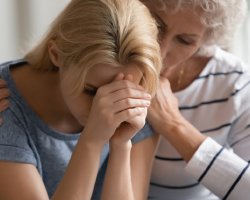Not Every Overdose Is Fatal, What Happens When the Addict Survives?

Our country is more familiar with drug overdoses than we perhaps ever have been. According to the Centers for Disease Control and Prevention, 70,237 people died in the U.S. from drug overdoses in 2017. That’s the highest that number has ever been in our country. It means that close to 200 people are dying from drug overdoses every day.
With all of the focus being on fatal overdoses, what a lot of people don’t know is that there are actually more nonfatal overdoses each year than there are fatal ones. It’s challenging to determine precisely how many nonfatal ODs occur each year. Many such overdoses go unreported. If an addict ODs on opioids at home and a friend revives him with naloxone, there’s a good chance that neither of them will report that the incident ever occurred.
“Hospital billing data from 2014 indicate that approximately 92,000 ED visits occurred for unintentional, nonfatal opioid overdoses…”
The best estimates we can get are from the records of emergency room visits for nonfatal drug overdoses. Again according to the CDC, “Hospital billing data from 2014 indicate that approximately 92,000 ED visits occurred for unintentional, nonfatal opioid overdoses, but the time lag poses challenges to monitoring and response.”
Just the emergency visits alone for nonfatal, opioid overdoses are significantly higher than the total number of fatal overdoses. For those of us who have a family member or loved one who is addicted to drugs, what do we do when our loved one survives an overdose? What steps do we need to take to ensure this does not happen again?
You Just Found Out Your Loved One Survived an Overdose. Now What?
A cursory Google search reveals that there is very little information on what the loved ones of an addict should do, should that addict survive an overdose. And this is concerning, as the period immediately following a survived overdose is critical.
A lot of information is out there, but none of it seems to meet exactly what we’re looking for here. For example, a resource out of Rhode Island provides helpful information on how to respond to an overdose.
In a separate briefing, the International Overdose Awareness Day initiative provides a wealth of helpful information on overdoses, how they happen, how to recognize them, how to treat them, etc.
The Drug Enforcement Administration offers helpful information for teens on how to respond to a friend’s overdose.
All of these resources provide valuable data and are helpful, but none of them answer the striking question, “My loved one just survived an overdose. What do I do?”
“… Research shows that people who have had at least one overdose are more likely to have another.”
According to the Centers for Disease Control and Prevention, “For every drug overdose that results in death, there are many more non-fatal overdoses, each one with its own emotional and economic toll. This fast-moving epidemic does not distinguish among age, sex, or state or county lines. … Research shows that people who have had at least one overdose are more likely to have another.”
It follows then, logically, that the more overdoses a person has, the more likely they are to experience a fatal overdose. So what does the family do when they find out a loved one just survived an OD?
The key lies in getting your loved one into a residential drug rehab and treatment center. Most importantly, the key lies in doing this very quickly.
Getting Your Loved One Into Treatment—Why Should This be the First Step?

There are very few things to be thankful for when a loved one experiences an overdose. A survived overdose is a brush with death. It was and is the closest that a lot of people ever come to dying before their time. But in a way, a survived overdose can also act as a harsh reminder of just how dangerous drug use is. It can remind us how crucial it is that the overdose survivor gets the help he or she needs to ensure that they do not overdose again.
When you take your loved one to a residential treatment center, you are checking them into a facility where they will be safe from the potentially fatal nature of drug use. While in treatment, your loved one will not have access to drugs or alcohol, they won’t be in a position where they can OD, drive drunk or drugged, get into a substance-induced altercation, have an under-the-influence accident, etc. Instead, they will live in a residential setting, totally drug-free, and surrounded by peers and professionals alike who will help them work through the issues and details of their drug habit.
Going to a drug and alcohol rehab center is a chance to break away from the vicious cycle of addiction. Addicts cannot break free from their habits on their own. They require help, and the best, safest way to get that help is within the secure, grounded setting that a residential treatment center provides.
Residential Drug Rehab
Drug addiction is a tormenting hardship. It’s stressful, and it’s dangerous. For those who struggle with it, it’s a crippling, seemingly unresolvable condition that gets worse the longer it goes untreated. For the family members and loved ones of an addict, it’s a daily cycle of worrying and stressing, never knowing if today will be their loved one’s last day.
That is why residential treatment is so crucial for those who struggle with drug addiction or alcohol addiction. A long-term approach to drug and alcohol addiction that takes place in a residential center is the only way to safely and effectively combat addiction. Such an approach immediately relieves an addict and his or her family members of the constant threat of a fatal overdose. And such a program provides the tools for helping that addict address the underlying reasons why he or she turned to drugs and alcohol in the first place.
If you have a family member or loved one who is struggling with drug or alcohol addiction, do your best to get them into a residential treatment center as soon as possible. Doing so will likely save their life.
Sources:
- https://www.cdc.gov/drugoverdose/data/statedeaths.html
- https://www.cdc.gov/mmwr/volumes/67/wr/mm6709e1.htm
- https://preventoverdoseri.org/respond-to-overdose/
- https://www.overdoseday.com/overdose-basics/
- https://www.justthinktwice.gov/when-your-friend-overdoses-drugs
- https://www.cdc.gov/drugoverdose/data/nonfatal.html


 ®
®